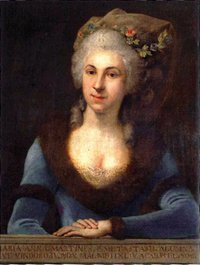
Although the spelling of her name is debated – Marianna/Mariana/Marie Anne, Martines/Martinez – it’s clear that she was a talented and driven composer. Born in Vienna in 1744 to a wealthy Austrian mother and a Neapolitan father, she grew up with her five surviving siblings in the Michaelerhaus in the heart of Vienna next to the Michaelerkirche (St. Michael’s Church). Her compositions and singing quickly became well-known throughout the city, even reaching the attention of Empress Maria Theresa in 1761 with a performance of one of her masses at the court church.
Unlike her male contemporaries, Martines was not eligible for any paid musical positions. However, this actually worked in her favor. By her mid-forties, her brother (and, by extension, the whole family) was raised to the nobility by the Empress for his work as a tutor to the royal children. The now van Martines was not only able to but expected to turn her focus towards the arts or entertaining. Of course, Marianna took this to an extreme and worked diligently every day on her compositions and practice. In addition, because the Empress had closed theaters and concert halls, private concerts became popular. Although her music would likely not have been performed publicly, she became a popular composer for these private concerts, even hosting her own concert series, which was frequented was the Mozarts.
She quickly gained an international reputation, partly due to an older librettist who also lived in the Michaelerhaus – Metastasio. He had acquired great fame as a librettist and playwright, with composers including Hasse, Pergolesi, and Scarlatti setting his words to music. He recognized early on that Marianna had a musical gift, and he, along with a teenage Hadyn (who lived in the attic room of the house) and Nicolò Porpora, taught Marianna composition and singing.
Although she received accolades and awards for her compositions (including a mention by the Queen of Naples, and an invitation to the Accademia filarmonica in Bologna, the first woman invited since its founding in 1665), she always erred on the side of caution and conservatism. As an upper-class woman, she thought it would appear improper to travel to Naples or Bologna and chose to remain in Vienna in her world of private concerts. Because of this “propriety,” her invitation was rescinded as the Accademia required the composer to be present at the performance of their work. This conservatism also appears in her works; while they are beautiful and incredibly virtuosic, they rely on older styles and use older instruments (like the harpsichord rather than exploring innovations in piano technology).
During Martines’ lifetime, ideas about women and music were gradually changing – for the worse. By remaining so conservative, she was able to continue to have her music performed and was respected in the Viennese musical community. Some of her male counterparts, like Mozart and Haydn (and later Beethoven), were able to innovate more freely and push musical boundaries. If she had tried to do the same, it is likely that she would have been dismissed and ridiculed. Although she never wrote a symphony or an opera, she still succeeded in her own way by being a brilliant and talented composer whose works were performed all over Vienna in her lifetime.
Unfortunately, by the 1800s, the musical world was really starting to close its doors to women as new 19th-century stereotypes about gender and music came into play. (See my post on Clara Schumann for more information). Perhaps this is why her music has been slowly forgotten. She died in 1812, only two days after her last sister passed away, with no memorial.
Our livestream featured two works by Marianna – La Tempesta, a cantata set to a Metastasio libretto, and her Sonata in E Major. In La Tempesta, a shepherd boy is desperately in love with Nice, a beautiful shepherdess. He offers to help her protect her sheep from a looming storm, and by the end of the cantata, he realizes she loves him.
See below for the video of our livestream concert. Enjoy!
The information in this blog comes from Anna Beer’s absolutely fantastic book “Sounds and Sweet Airs” and the Grove Music Online article about Martines. If you want to perform La Tempesta or the Sonata, Dave has made a lovely edition from the original scores. Just shoot me a message for it.
3 replies on “Marianna von Martines”
[…] she should never show this ability in public, only in the company of family or acquaintances. Mariana Martines pushed this idea further than many women in Vienna by having well-publicized home concerts that […]
[…] her youngest daughter in 1775. Through him, she was exposed to the music of Maria Teresa Agnesi and Marianna Martines, contemporaries of hers from Milan and Vienna, respectively. Ricci left the Netherlands in 1780, […]
[…] Mariana Martines (1744-1812) […]